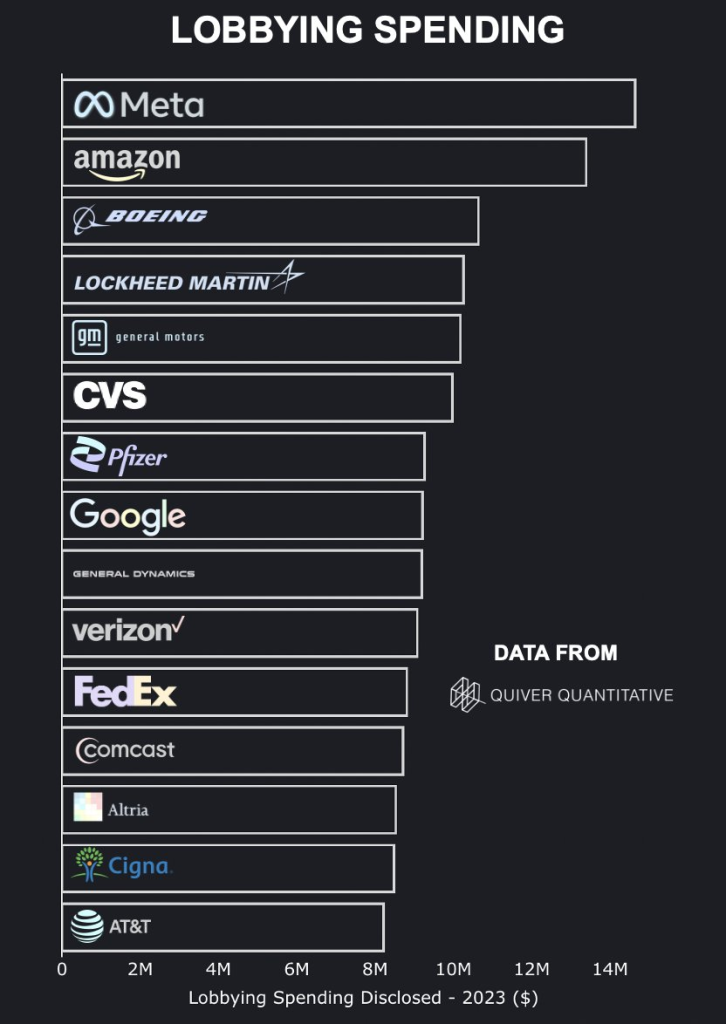In the world of corporate influence and policy shaping, lobbying remains a crucial activity undertaken by companies to sway legislation and regulation in their favor. Based on data from Quiver Quantitative, we can see a revealing snapshot of the lobbying spending disclosed by several high-profile corporations in 2023.
Meta Leading
The chart shows that Meta leads the pack with lobbying expenditures approaching the $14 million mark, reflecting the technology giant’s intensive efforts to influence decision-making in areas that likely include data privacy, internet regulation, and antitrust matters. Close behind is Amazon, a company that has vested interests in federal regulation regarding e-commerce, trade, logistics, and technology, with its lobbying spending hovering around $12 million.
Aerospace and defense contractors Boeing and Lockheed Martin also feature prominently, with spending that indicates their active involvement in defense policy, government contracts, and international relations, with expenditures nearing $10 million and $8 million, respectively.
The automotive industry is represented by General Motors, which appears to have spent around $7 million, likely on issues related to transportation policy, electric vehicles, and manufacturing regulations.
In the healthcare sector, both CVS and Pfizer are significant players, with lobbying figures suggesting a focus on pharmaceutical regulations, healthcare delivery, and insurance laws.
Google’s spending stands out among its tech peers, albeit lower than Meta’s, indicating its strategic interest in shaping internet policy, intellectual property law, and global data standards.
The chart also includes other major players such as General Dynamics, Verizon, FedEx, Comcast, Altria, Cigna, and AT&T. Their lobbying efforts span across various sectors from telecommunications to shipping logistics, highlighting the diverse range of policy areas corporations are looking to influence.
Scratching the Surface
The disclosed lobbying expenditures only scratch the surface of corporate efforts to influence policy and decision-making. When we consider the long-standing practice of Board of Directors (BOD) fees paid to former politicians and ex-military officials, the financial commitment of companies to sway political and regulatory landscapes becomes even more pronounced.
These payments represent a strategic investment in experience and connections that can open doors and smooth the pathways for policy advocacy. Over the years, this pattern of enlisting influential figures onto corporate boards has woven a complex tapestry of power and persuasion, where high-level expertise and insider knowledge are leveraged for the benefit of corporate agendas.
The graph paints a telling picture of how corporate lobbying is an integral part of the American political landscape. The disclosed amounts are substantial, showcasing the investment companies are willing to make to protect and advance their interests. This financial commitment to lobbying efforts underscores the high stakes involved in securing favorable legislative and regulatory environments.
Author Profile

- Lucy Walker covers finance, health and beauty since 2014. She has been writing for various online publications.
Latest entries
- April 25, 2025Global EconomicsWhistleblowers Unmask Schwab’s Toxic WEF Secrets
- April 9, 2025Global EconomicsTariff Tensions Drive Market Volatility
- March 18, 2025Global EconomicsRed in Name Only: Labour’s War on the UK Working Class
- March 7, 2025SatoshiCraig Wright Banned from UK Courts with Civil Restraint Order





